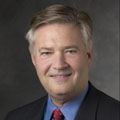How do you make sense of a Republican presidential race with 17 candidates running 15 months before the election? It's a lot like making sense of the Major League Baseball season in August, two months before the World Series. My logic parallels that of former Dodger manager Tommy Lasorda who said: "There are three types of baseball players: Those who make it happen, those who watch it happen and those who wonder what happens."
For starters, you have to know what you are trying to "make happen" at this stage of the season. No team is trying to win the World Series in August; instead the goal is to get in position to be one of the 10 (of 30) teams to make the playoffs where, as they say, anything can happen. Likewise, 17 Republicans are not trying to be the final party nominee this early, they're just trying to be one of the 3-5 candidates left standing next summer. As in baseball, that's really about developing momentum and finding the money to remain in the race as long as possible.
Then to understand baseball at this stage, you'd have to look at the races within the race: which teams are competing for the automatic playoff berths of division championships and which teams are realistically positioning themselves for the less secure wild-card slots? Fewer people understand that, among 17 candidates, there are mini-races as well. Jeb Bush and John Kasich are vying for the "moderate" slot in the final rounds. Donald Trump can afford to stay in the race as long as he wants, holding the special "reality star" berth. All the rest are competing to be among two or so "conservatives" left standing a year from now.
Of course, many teams are not realistic contenders this year and are positioning themselves for the future, and so too are some of the candidates. Some are staking out particular issues and constituencies, such as Mike Huckabee and Rick Santorum with conservative Christians. As a woman, Carly Fiorina is useful in attacking Hillary Clinton and her record. Some are really running for vice president (Carly Fiorina, Bobby Jindal, and even Marco Rubio come to mind) and several are building war chests and name recognition for the future.
So in Tommy Lasorda's trilogy, who is making it happen? I would say Bush, Walker and Trump, with Rubio still a possibility. Bush will be the moderate finalist, Walker the conservative, and Trump the reality wild card. Rubio, or someone else, might join Walker as a conservative near the end.
Notably, Donald Trump is this year's wild card who may become a new norm. As a reality television personality, he uses his platform to connect with people's anger and frustrations about politics. He has the money to stay in the race as long as he wants to and you know what? Staying in the race helps build his personal "brand" no matter how well he fares politically. The last time we had a candidate of this sort was Ross Perot in 1992, who ran as an independent and collected an amazing 19% of the popular vote but none of the all-important electoral votes. He arguably did split the Republican votes sufficiently to prevent George W. Bush's reelection, which is a problem for the party again this time if Trump continues next fall as an independent candidate. Imagine 2020's version of the Kardashians or Jenners running next time.
A few are, in Lasorda's words, at least watching it happen: Ted Cruz, Rand Paul, Chris Christie, and perhaps Carly Fiorina. And the rest, well no one is likely to even remember that they ran once it's all over. Polls are already at work deciding who will be in the field when the next debate moderators say: Play ball. Like baseball, presidential politics is a long season.
Comment by clicking here.
David Davenport is a fellow at the Hoover Institution, Stanford University's policy think tank. He writes about politics, law and world affairs, piecing together where the policies underlying the headlines will lead us. He's enjoyed an interesting career as an attorney, professor, university president (Pepperdine University, 1985-2000) and now a research scholar. He recently co-authored a book called "New Deal and Modern American Conservatism.".
Reprinted from Forbes.com


 Contact The Editor
Contact The Editor
 Articles By This Author
Articles By This Author
